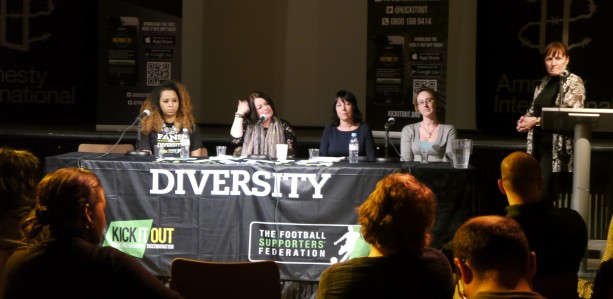There is still some room for improvement when it comes to sexism in football, writes Fiona McGee.
As a Leeds United fan and Football Supporters Foundation national council member, Fiona McGee evaluated the outcome of the latest Fans for Diversity event ‘A Woman’s Place is at the Match.’
The event saw women and men talking about their experiences within football. They took part in a lively and entertaining panel discussion of women’s experiences of watching men’s football. Roisin Wood from Kick It Out chaired the evening, and the panel consisted of four female football fans: Hayley Bennett, an Arsenal supporter and KIO’s Education Officer; Katrina Law of Tottenham Hotspur Supporters’ Trust; me, Fiona McGee, a Leeds United fan and FSF national council member; and Helen Wright, London Sunderland Supporters’ Club.
The discussion kicked off with the panel members explaining how they became football fans in the first place, some through family, and others via friends. They then spoke about whether they felt that their experiences of attending matches differed from those of their male counterparts before it was opened up to the floor for others to ask questions and share their experiences.
A wide variety of issues were raised and debated, for example, how it can sometimes seem as if you have to ‘prove’ yourself as a female fan in a way in which men do not, because there is an assumption you must be there for a reason other than a genuine love of the game. One woman talked about how, at a recent European away game, a group of young men were chanting about how there is no place for women at football, whilst several others talked about their experiences of being ‘shot down’ on social media if they dared to express an opinion which disagreed with others (in one person’s case, being asked if she had PMT!).
A few of those present said that sexism has never been something that particularly bothers them at games, as they choose to ignore it, but for other women present, the ‘macho’ atmosphere is something that makes them think twice about going, especially if they are going to be by themselves. There was a debate about taking direct action to combat sexism and if this might lead to the ‘sanitisation’ of atmosphere at matches, something people did not want to see. Most people at the event felt that fans and clubs do need to challenge sexism, whilst not detracting from the wit and humour that is characteristically found in most football crowds.
The role that clubs themselves and the football authorities could play in making football more welcoming to women was discussed, with most feeling that there is still a lot more they could be doing. The main agreed action was to actually listen to what women fans tell them they want from the game (on all issues, not just sexism), rather than thinking about what an influx of more women could do to enhance the clubs’ and authorities’ own agenda.
Overall, the evening represented a great way to kick off a conversation about women’s experiences of attending men’s football matches and successfully looked at ways in which the game could be made more welcoming to women, there was a lot of enthusiasm in the room for continuing that dialogue and it is evident that sexism is still an issue.

